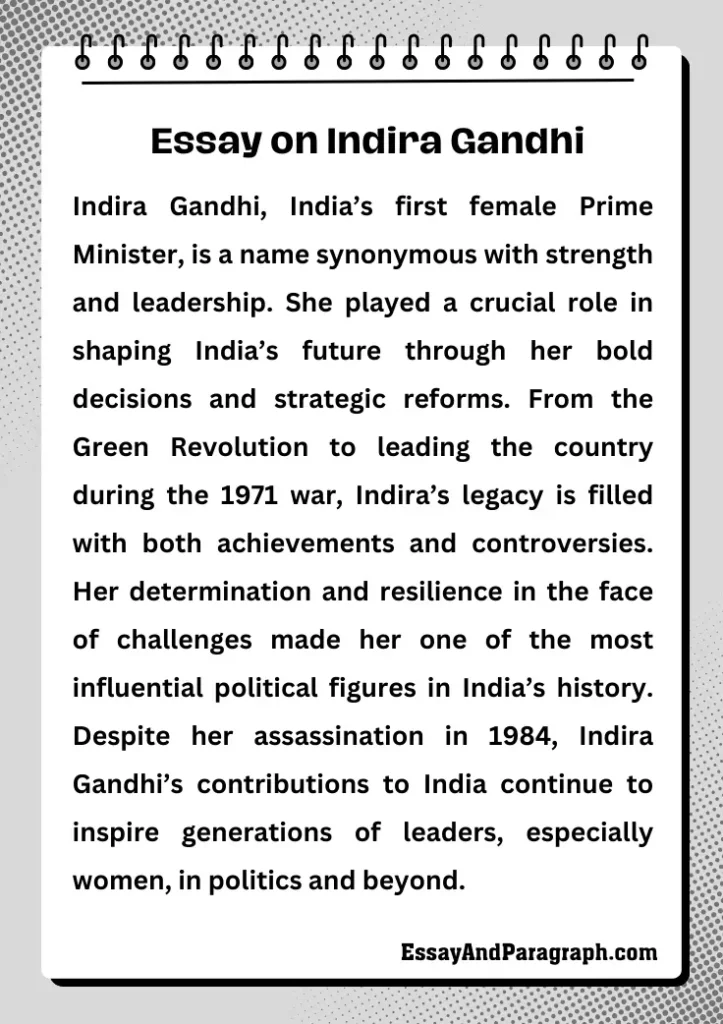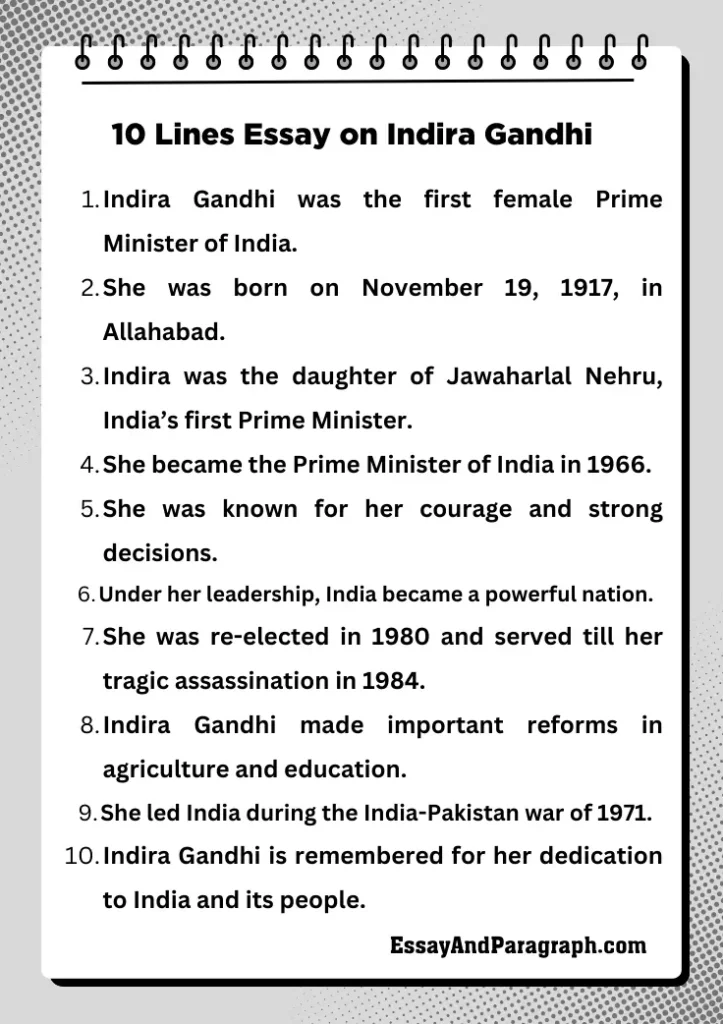Have you ever heard of Indira Gandhi, the first woman to become the Prime Minister of India? She was not just a political leader, but an icon who shaped India’s history and future. Known for her strength and leadership, Indira Gandhi became one of the most important figures in India’s political journey. In this article, we will learn how to write an essay on Indira Gandhi and explore her remarkable life.
10 Lines Essay on Indira Gandhi in English
Indira Gandhi was the first female Prime Minister of India.
She was born on November 19, 1917, in Allahabad.
Indira was the daughter of Jawaharlal Nehru, India’s first Prime Minister.
She became the Prime Minister of India in 1966.
She was known for her courage and strong decisions.
Under her leadership, India became a powerful nation.
She was re-elected in 1980 and served till her tragic assassination in 1984.
Indira Gandhi made important reforms in agriculture and education.
She led India during the India-Pakistan war of 1971.
Indira Gandhi is remembered for her dedication to India and its people.

10 Lines Essay on Indira Gandhi
Short Essay on Indira Gandhi in English
Indira Gandhi, India’s first female Prime Minister, was born on November 19, 1917. She came from a political family, as her father, Jawaharlal Nehru, was the first Prime Minister of India. Indira was determined to make her own mark in politics. She became the Prime Minister of India in 1966, at a time when the country faced many challenges.
She was known for her strong and decisive leadership. Indira Gandhi played a key role in the 1971 India-Pakistan war, which led to the creation of Bangladesh. Her leadership during this time is remembered as a symbol of courage and determination. She also worked towards improving India’s agriculture with the Green Revolution, helping the country become self-sufficient in food production.
However, her tenure was not without controversy. In 1975, she declared a state of emergency in India, giving her more power to rule. This decision was highly debated and led to her temporary loss of political support. Despite this, she returned to power in 1980. Sadly, Indira Gandhi was assassinated on October 31, 1984, by her own bodyguards. Her death left a deep impact on India and the world.
Indira Gandhi’s legacy lives on as a strong leader who broke barriers for women in politics and left a lasting influence on India’s growth and development.
Long Essay on Indira Gandhi in English
Indira Gandhi, born on November 19, 1917, in Allahabad, was the daughter of Jawaharlal Nehru, India’s first Prime Minister. From a young age, she was exposed to politics and the struggle for India’s independence. Her father’s influence played a crucial role in shaping her political beliefs and ambitions. Indira was educated in India and abroad, and she soon became a force in Indian politics.
Indira Gandhi became the Prime Minister of India in 1966, following the sudden death of Lal Bahadur Shastri. Her appointment marked a historic moment as she became the first female Prime Minister of India. At the time, India was facing economic difficulties, political instability, and tensions with neighboring countries. However, Indira Gandhi’s leadership brought a sense of stability to the country.
One of her greatest achievements was the victory in the 1971 India-Pakistan war, which led to the creation of Bangladesh. Her decisive role in this war earned her immense respect and recognition both in India and globally. She was also instrumental in introducing the Green Revolution in India, a series of agricultural reforms that made India self-sufficient in food production and helped lift millions of farmers out of poverty.
Indira Gandhi’s leadership was also marked by her bold decision to declare a state of emergency in 1975. The emergency gave her the power to rule by decree, suspending civil liberties and curbing political opposition. This decision was highly controversial and led to widespread protests. Eventually, the emergency was lifted, and Indira Gandhi faced elections, which she lost in 1977. However, she made a strong comeback in 1980 and regained her position as Prime Minister.
Indira Gandhi’s tenure was not without its challenges, but she remained a resilient and powerful leader. She was assassinated on October 31, 1984, by her own bodyguards, which shocked the nation. Despite her controversial decisions, she is remembered as one of India’s most influential leaders, who played a key role in shaping the nation’s political landscape.
Indira Gandhi’s legacy as India’s first female Prime Minister continues to inspire generations of women and leaders across the world. She proved that leadership is not bound by gender, and her contributions to India’s growth remain significant to this day.
Frequently Asked Questions (FAQs) About Indira Gandhi
1. Who was Indira Gandhi?
Indira Gandhi was the first female Prime Minister of India. She was born on November 19, 1917, and served as Prime Minister from 1966 to 1977 and again from 1980 until her assassination in 1984. She played a key role in shaping modern India.
2. What were Indira Gandhi’s major achievements?
Indira Gandhi’s major achievements include leading India during the India-Pakistan war of 1971, which resulted in the creation of Bangladesh. She also introduced the Green Revolution, which helped make India self-sufficient in food production.
3. Why did Indira Gandhi declare a state of emergency in 1975?
In 1975, Indira Gandhi declared a state of emergency in India due to political instability and opposition protests. This decision allowed her to rule by decree and suspend civil liberties. The emergency period is controversial in Indian history.
4. What led to Indira Gandhi’s assassination?
Indira Gandhi was assassinated on October 31, 1984, by her bodyguards, who were Sikh militants seeking revenge for the military operation she ordered at the Golden Temple. This operation aimed to remove militants hiding there during the Sikh separatist movement.
5. How is Indira Gandhi remembered today?
Indira Gandhi is remembered as a strong and determined leader who made significant contributions to India’s growth. Despite her controversial decisions, her leadership during key moments in India’s history continues to be celebrated.
Top 5 Quotes on Indira Gandhi
“You cannot shake hands with a clenched fist.” – Indira Gandhi
“Forgiveness is a virtue of the brave.” – Indira Gandhi
“There are two kinds of people, those who do the work and those who take the credit. Try to be in the first group; there is less competition there.” – Indira Gandhi
“The more you sweat in peace, the less you bleed in war.” – Indira Gandhi
“My only concern is to do the right thing, and I will always be guided by my conscience.” – Indira Gandhi
Summary
Indira Gandhi, India’s first female Prime Minister, is a name synonymous with strength and leadership. She played a crucial role in shaping India’s future through her bold decisions and strategic reforms. From the Green Revolution to leading the country during the 1971 war, Indira’s legacy is filled with both achievements and controversies. Her determination and resilience in the face of challenges made her one of the most influential political figures in India’s history. Despite her assassination in 1984, Indira Gandhi’s contributions to India continue to inspire generations of leaders, especially women, in politics and beyond.












